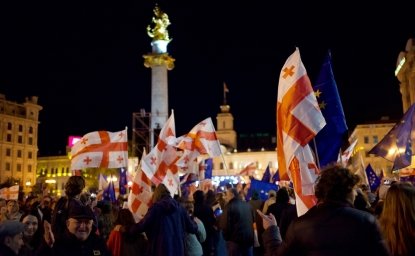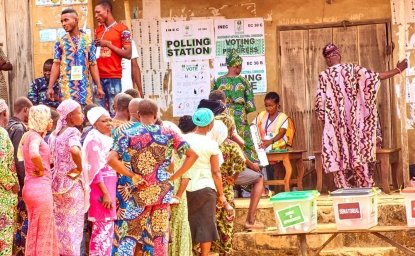In 2013, millions of Israelis, Iranians, and Arabs will vote in at least 10 pivotal elections that will, in turn, address basic issues facing the Middle East: What is the new framework for government after the “Arab Spring”? How much influence should religion have in running a Middle East state in the 21st century? Who are the new leaders and parties likely to shape political life for the next decade? And how will their agendas affect both domestic and regional policies?
The 10 countries have vast political, religious, ethnic, and economic differences. But most confront a common trend—the rise of the right or the religious right—that will influence elections as well as policies both at home and in the broader region.
ISRAEL
Israel is scheduled to hold a national election on January 22. Prime Minister Benjamin Netanyahu is widely expected to win. But he faces a growing challenge from charismatic Naftali Bennett, a former Netanyahu chief-of-staff who turned further right, abandoned his boss, and now heads the Jewish Home Party. Bennett once served in an elite military unit, then made over $100 million in a high-tech start-up. He is best known, however, as a champion of the settler movement. In 2012, he proposed annexing almost two-thirds of the West Bank.
Polls indicate Bennett’s party could triple its seats in the Knesset—from five to up to 15—and come in third to Likud and Labor. The Bennett factor could, in turn, push any new governing coalition further right and, in turn, affect prospects of reviving the moribund peace process anytime in the near future.
IRAN
Iran’s presidential election is scheduled for June 14. It will be the first presidential poll since the disputed 2009 election allowed President Mahmoud Ahmadinejad a second and final term. The field of candidates is likely to be more limited and more conservative than at any time since the constitution was amended to create an executive presidency in 1989. Candidates are vetted by the 12-man Council of Guardians, but Supreme Leader Ayatollah Ali Khamenei is also expected to have unprecedented influence behind the scenes since his personal endorsement of Ahmadinejad in 2009 turned protesters against him as well as the president.
The reformists, most notably in the Green Movement opposition, have been sidelined for the past three years. Reformists are not expected to be able to field even a marginal candidate, since the regime has still not fully recovered from the 1997 upset victory of dark horse reformer Mohammed Khatami. The Green Movement’s two symbolic leaders—Mir Hossein Mousavi and Mehdi Karroubi, both presidential candidates in 2009—have been under house arrest since 2011.
The final candidates—usually four serious contenders -- are also expected to have direct or indirect ties to the Revolutionary Guards. The elite military branch has growing political and economic influence as well as stature as the most powerful military wing. Speculation has so far centered around conservatives who fit all three criteria, including Tehran Mayor Mohammad Bagher Qalibaf, Parliamentary Speaker Ali Larijani, National Security Adviser (and chief nuclear negotiator) Saeed Jalili, and Ali Akbar Velayati, a former foreign minister now advising the Supreme Leader.
THE ARABS
The most dynamic new trend in the Arab world is the mobilization of ultra-conservative Salafis, who have long been apolitical, into new parties. Salafis are effectively populist Puritans. They want to model 21st century life on early Muslim life after the faith was founded in the 7th century. Salaf literally means “ancestor” or “predecessor” in Arabic; it refers to the first three generations of Muslims. Salafis strongly advocate adopting shari’a (Islamic law) in the new constitutions of countries now undergoing transitions from autocratic rule to more democratic life.
The agenda of Salafi parties varies widely, even within countries. They also vary in popular support, although their political clout is often disproportionate to their numbers. More broadly, they have redefined the political spectrum in countries such as Egypt and Tunisia, where “secular” and “liberal” had been on one end of the spectrum and “Islamist” on the other. Now there is a whole spectrum just of Islamist groups.
The Arab world is tentatively scheduled to hold eight national or local elections in 2013. They include Egypt, the Palestinian Authority, Tunisia, Libya, Jordan, Iraq, Lebanon, and Qatar.
EGYPT: The most important election will be in Egypt, traditionally the Arab trendsetter. It also accounts for roughly one-quarter of the Arab world’s 350 million people. It is due for parliamentary elections within two months of the constitution passing in December 2012. The main race is likely to be among diverse Islamist parties that together won more than 70 percent of the vote in parliamentary elections last year. (An Egyptian court later nullified results for the lower house of the National Assembly.)
The 85-year-old Muslim Brotherhood, which won almost half the votes in the last election, is under growing pressure from the emerging Salafi right. A coalition dominated by the Nour Party won 25 percent of the vote last year, elevating the inexperienced Salafis to the second largest party in the country just months after they entered politics. Many Salafis now contend that the Muslim Brotherhood has compromised the Islamist agenda, whether in the new constitution or in loans from the International Monetary Fund, since paying interest in Islam is consider usury.
But the Salafis have started splintering further. Last month, more than 100 leading members of the Nour Party, including its leader and former members of parliament, broke away to form two new parties. Emad Abdel Ghafour, Nour’s former frontman, announced the creation of al Watan, or the Homeland Party. Presidential candidate Hazem Salah Abu Ismail also announced the formation of a new Salafi party that would run in alliance with al Watan. Abu Ismail was disqualified from running for president because his mother had acquired foreign (American) citizenship, prohibited for presidential aspirants.
The Salafi split is reportedly over the role (and powers) of clerics in the party, an issue that spills over into the ongoing national debate about how strictly Muslim law and traditions should be implemented in the new political system.
Egypt also has several secular, liberal, and independent parties, many of which coalesced in the National Salvation Front to oppose the constitution because of provisions that could be used to restrict rather than expand freedoms, particularly for minorities and women. They have discussed whether to run a common list in elections for a permanent parliament. But most are still weak and, so far, seem unlikely to get more seats than the Islamists.
PALESTINIAN AUTHORITY: The Palestinians are overdue for both presidential and parliamentary elections, originally set for 2010. Tensions between the two dominant parties—Fatah and Hamas—have delayed a vote. But secular Fatah now appears to be losing out to Hamas, an offshoot of Egypt’s Muslim Brotherhood that is supported by Iran.
A public opinion poll on December 26, 2012 found that 60 percent of Palestinians polled supported Hamas’s use of armed attacks to end the Israeli occupation—an 11 percent increase from a year earlier. Only 28 percent supported President Mahmoud Abbas’s efforts to negotiate a peaceful settlement, according to the Palestinian Center for Policy and Survey Research. The poll also reported a 7 percent increase in support for Hamas and its leadership if legislative and presidential elections were held now.
The survey came one month after the eight-day conflict between Israel and Hamas, which dominates Gaza. Fatah also fared poorly in municipal elections held in fall 2012 only in the West Bank where Fatah traditionally dominated. The party of Palestine Liberation Organization founder Yasser Arafat was beaten for seats in key cities, such as Ramallah, Nablus, and Jenin even though Hamas boycotted the vote.
TUNISIA is expected to vote on a new constitution and then hold permanent elections for parliament by June 23. Ennahda, or the Islamist Renaissance Party, won a 41 percent plurality in the 2011 election. The comparatively moderate party is widely expected to do well again, even though it has come under criticism from the left, center, and Salafist right on economic and political issues.
Over the past year, the Arab world’s most secular country has also faced the rise of Salafis in both peaceful protests and militant attacks. An Islamist-led government has been in the unusual position of having to arrest or kill religious hardliners during violent encounters. Its security forces killed four and detained more than 80 after thousands attacked the U.S. Embassy and neighboring American school in Tunis in September 2012.
Ennahda leaders have encouraged non-violent Salafis to form a political party to work for change within the system rather than trying to destroy it from outside. Salafis in the new Islah Party were granted a license last year. In tell-tale beards and shortened white robes, Salafis have become notably more visible in rural towns in Tunisia’s interior, where the government has not generated economic solutions.
LIBYA could also face a referendum on its constitution and a vote for a permanent parliament in 2013, although the process has dragged out due to both political and security problems. A central problem has been debate over whether the committee to write a new constitution should be pulled from the 200 members of the General National Congress elected in July 2012 or be elected in a new poll.
In contrast to elections in Egypt and Tunisia, Libya’s National Forces Alliance (NFA), a coalition of four secular parties, won the largest single bloc in the temporary congress—39 of the 80 seats allocated to parties. The NFA’s appeal was largely due to public familiarity with Mahmoud Jibril, a former minister of justice under Moammar Qaddafi who defected to the rebels and became their de facto prime minister. He fronted the coalition, even though he could not run as a member of the original transition government. The Muslim Brotherhood’s Justice and Construction Party came in second with 17 seats.
But the tally does not tell the full story, as 120 of the 200 congressional seats went to independent candidates. Libya is a conservative and observant society, so the Muslim Brotherhood claims it actually has the largest following—by combining formal party seats and informal backing among independent candidates. It also claims it will have an effective veto over language about Islam’s role in the new constitution.
Public frustration with the transition process also now runs deep, partly due to rampant corruption in the oil-rich North African nation. Even government officials say the culture of corruption spawned during Qaddafi’s rule has only gotten worse. One of the Islamic right’s greatest appeals is a perception that they are less greedy than officials in the transitional government.
JORDAN is scheduled to hold parliamentary elections on January 23. The Islamic Action Front, another offshoot of Egypt’s Muslim Brotherhood, has been the strongest opposition force for more than two decades. But it is boycotting the poll at a time of mounting pressure on the Hashemite monarchy from many quarters because of King Abdullah’s failure to follow through on meaningful political and economic reforms.
The eight Arab monarchies—Jordan, Morocco, and the six Gulf sheikhdoms—have so far survived crippling political protests. Only Bahrain has witnessed sustained unrest, initially but not permanently quashed after Saudi Arabia and other emirates deployed troops. But Jordan is particularly vulnerable, given its fragmented populace, vulnerable economy, and volatile borders with Syria, the Palestinian Authority, and Iraq.
IRAQ is due to hold local elections in April. They come at a time of deepening sectarian and ethnic divisions among the Shiites, Sunnis, and Kurds. Traditional tribal differences are also redefining the political landscape in the run-up to the vote. Protests in western Anbar reflect the tensions. 5
Between 2004 and 2007, Anbar was Iraq’s most volatile of the 18 provinces due to al Qaeda militants, foreign fighters, and Saddam Hussein loyalists. It was pacified by Sunni tribal leaders and American troops working with a Shiite-led government. But the same Sunni tribes have turned on the Shiite prime minister over the past year for repressing Sunnis, including a vice president charged with terrorism and sentenced to death after he fled the country.
Protesters recently set up a tent city on an international highway near Ramadi, the provincial capital. Tribes have their own tents sprayed with slogans slamming the government of Prime Minister Nouri al Maliki. Tribal leaders also complain that Baghdad failed to find jobs, pay, or incorporate Sunnis who fought to bring stability to Iraq’s largest province, as promised.
Identity politics has generally undermined prospects of solving core issues—such as the division of political powers and oil revenues—that have loomed since the 2003 ouster of Saddam Hussein.
LEBANON was due to hold parliamentary elections in June. But squabbling among parties representing the 17 recognized sects—particularly Shiite Hezbollah and the Sunni-dominated party of former Prime Minister Saad Hariri—has complicated a national dialogue over electoral reforms. The vote could get postponed.
Since 2011, Lebanon has also witnessed the rise of Salafis, particularly in the north. Hariri’s self-imposed exile in France has opened the way for a new breed of Salafi sheikhs and politicians to emerge from outside the traditional political families who long dominated Lebanese politics. Among them is firebrand preacher Ahmed al Assir. The spillover from Syria’s civil war has further fueled the Salafi trend, pitting the hardline Sunnis against Shiites and Alawites, a Shiite offshoot, who support Syrian President Bashar al Assad.
Finally, QATAR is tentatively scheduled to hold its first elections for a new Consultative Assembly in June. Political parties are not allowed. But both men and women will be eligible to vote for 30 members of parliament; another 15 will be appointed by the emir. The scope of its impact is still uncertain, especially since the emir appoints the prime minister.
This piece was originally published by the Middle East Program at the Wilson International Center for Scholars as Viewpoints No. 14.
Robin Wright is a joint fellow at the Woodrow Wilson International Center for Scholars and the U.S. Institute of Peace. A former correspondent for The Washington Post, her most recent book is Rock the Casbah: Rage and Rebellion Across the Islamic World (2011). Her blog is http://robinwrightblog.blogspot.com and her book website is http://www.robinwright.net.





